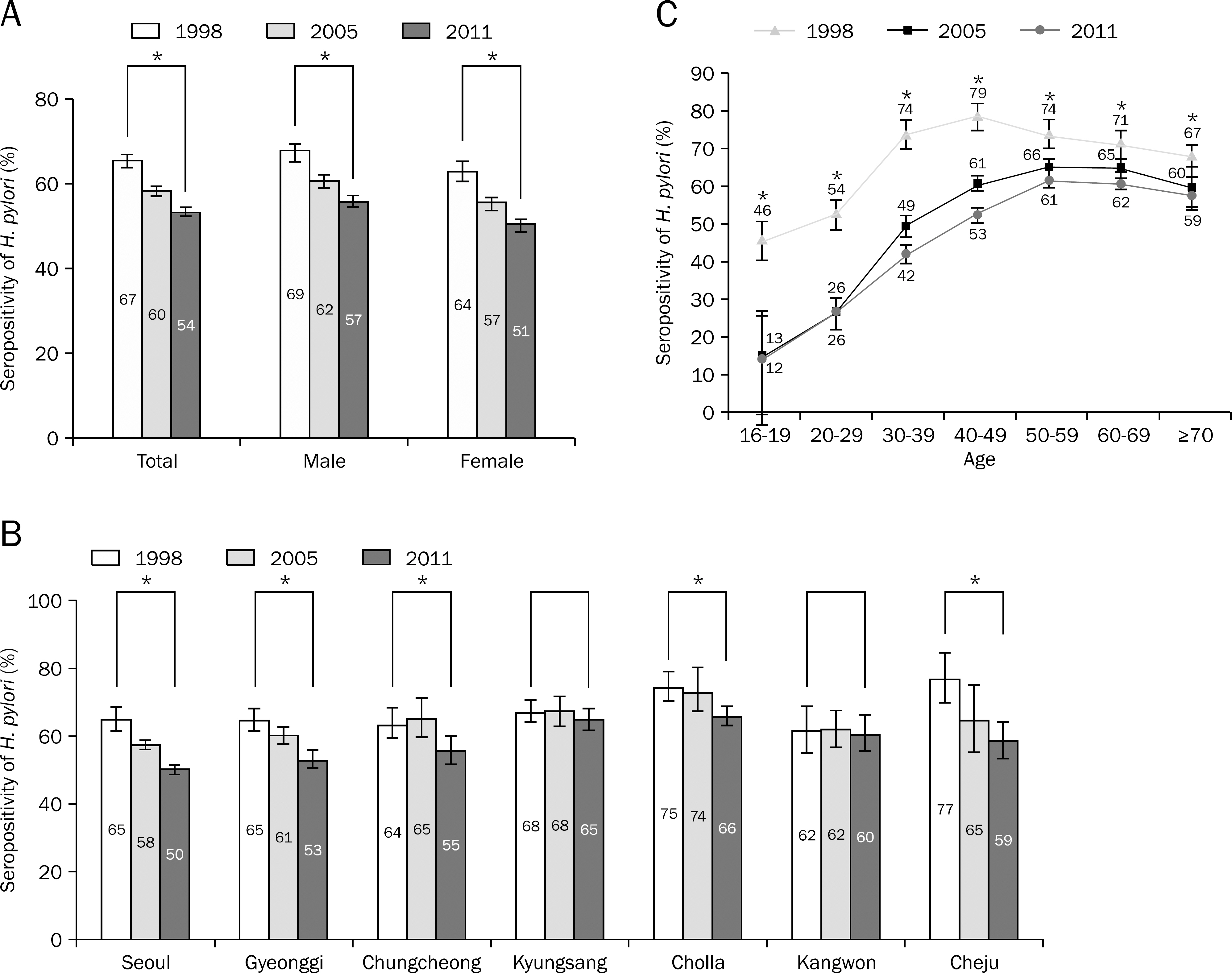Korean J Gastroenterol.
2015 Apr;65(4):199-204. 10.4166/kjg.2015.65.4.199.
Changes in Upper Gastrointestinal Diseases according to Improvement of Helicobacter pylori Prevalence Rate in Korea
- Affiliations
-
- 1Department of Internal Medicine, College of Medicine, The Catholic University of Korea, Seoul, Korea. psheon5132@naver.com
- KMID: 2373210
- DOI: http://doi.org/10.4166/kjg.2015.65.4.199
Abstract
- Helicobacter pylori can cause variety of upper gastrointestinal disorders such as peptic ulcer, mucosa associated lymphoid tissue (MALT)-lymphoma, and gastric cancer. The prevalence of H. pylori infection has significantly decreased in Korea since 1998 owing to active eradication of H. pylori. Along with its decrease, the prevalence of peptic ulcer has also decreased. However, the mean age of gastric ulcer increased and this is considered to be due to increase in NSAID prescription. Gastric cancer is one of the leading causes of cancer deaths in Korea and Japan, and IARC/WHO has classified H. pylori as class one carcinogen of gastric cancer. Despite the decreasing prevalence of H. pylori infection, the total number of gastric cancer in Korea has continuously increased from 2006 to 2011. Nevertheless, the 5 year survival rate of gastric cancer patients significantly increased from 42.8% in 1993 to 67% in 2010. This increase in survival rate seems to be mainly due to early detection of gastric cancer and endoscopic mucosal dissection treatment. Based on these findings, the prevalence of peptic ulcer is expected to decrease even more with H. pylori eradication therapy and NSAID will become the main cause of peptic ulcer. Although the prevalence of gastric cancer has not changed along with decreased the prevalence of H. pylori, gastric cancer is expected to decrease in the long run with the help of eradication therapy and endoscopic treatment of precancerous lesions.
MeSH Terms
-
Anti-Bacterial Agents/therapeutic use
Anti-Inflammatory Agents, Non-Steroidal/adverse effects
Gastrointestinal Diseases/complications/*epidemiology
Helicobacter Infections/complications/drug therapy/epidemiology
Humans
Lymphoma, B-Cell, Marginal Zone/epidemiology
Peptic Ulcer/epidemiology/etiology
Prevalence
Stomach Neoplasms/etiology/mortality/pathology
Anti-Bacterial Agents
Anti-Inflammatory Agents, Non-Steroidal
Figure
Reference
-
References
1. Moayyedi P. The health economics of Helicobacter pylori infection. Best Pract Res Clin Gastroenterol. 2007; 21:347–361.2. Yim JY, Kim N, Choi SH, et al. Seroprevalence of Helicobacter pylori in South Korea. Helicobacter. 2007; 12:333–340.3. Kim JH, Kim HY, Kim NY, et al. Korea H. pylori Study Group, South Korea. Seroepidemiological study of Helicobacter pylori infection in asymptomatic people in South Korea. J Gastroenterol Hepatol. 2001; 16:969–975.4. Lim SH, Kwon JW, Kim N, et al. Prevalence and risk factors of Helicobacter pylori infection in Korea: nationwide multicenter study over 13 years. BMC Gastroenterol. 2013; 13:104.
Article5. Bae SJ, Kim DS, Kim KM, Park CM, Kim HY. Health Insurance Review and Assessment Service (HIRA). Studies on the occur-enceof peptic ulcer disease and health care utilization patterns in Korean. A research report of HIRA (2010–05). Seoul: HIRA;2010.6. Kim JJ, Kim N, Park HK, et al. Clinical characteristics of patients diagnosed as peptic ulcer disease in the third referral center in 2007. Korean J Gastroenterol. 2012; 59:338–346.
Article7. Kwon JH, Choi MG, Lee SW, et al. Trends of gastrointestinal diseases at a single institution in Korea over the past two decades. Gut Liver. 2009; 3:252–258.
Article8. Kim JI, Kim SG, Kim N, et al. Korean College of Helicobacter and Upper Gastrointestinal Research. Changing prevalence of upper gastrointestinal disease in 28 893 Koreans from 1995 to 2005. Eur J Gastroenterol Hepatol. 2009; 21:787–793.9. Jang HJ, Choi MH, Shin WG, et al. Has peptic ulcer disease changed during the past ten years in Korea? A prospective multicenter study. Dig Dis Sci. 2008; 53:1527–1531.
Article10. Kim JI, Lee HJ, Kim JH, et al. Is there a difference between endoscopic finding and Helicobacter pylori infection in patients with chronic gastritis? Korean J Helicobacter Up Gastrointest Res. 2012; 12:178–182.11. Park HK, Kim N, Lee SW, et al. Korean College of Helicobacter and Upper Gastrointestinal Research. The distribution of endo,!scopic gastritis in 25,536 heath checkup subjects in Korea. Korean J Helicobacter Up Gastrointest Res. 2012; 12:237–243.12. Sung KC, Shim SC, Kim SH, et al. Esophgogastroduodenoscopic findings in 9,137 healthy subjects examined for the secondary prevention. Korean J Gastrointest Endosc. 1998; 18:161–168.13. Tytgat GN. Role of endoscopy and biopsy in the work up of dyspepsia. Gut. 2002; 50(Suppl 4):iv13–iv16.
Article14. Kim JG. Eradication rates of H. pylori in Korea over the last 10 years; retrospective nationwide survey. Proceedings of 22nd Conference and Satellite Symposium of Korean College of Helicobacter and Upper Gatrointestinal Research. 2013. Dec 6–7; Seoul, Korea. Seoul: Korean College of Helicobacter and Upper Gastrointestinal Research, 2013.15. Correa P. Human gastric carcinogenesis: a multistep and multi-factorial process–First American Cancer Society Award Lecture on Cancer Epidemiology and Prevention. Cancer Res. 1992; 52:6735–6740.16. Fox JG, Wang TC. Inflammation, atrophy, and gastric cancer. J Clin Invest. 2007; 117:60–69.
Article17. Ministry for Health, Welfare and Family Affairs. Annual report of cancer incidence (2007), cancer prevalence (2007) and survival (1993–2007) in Korea. Seoul: Ministry for Health, Welfare and Family Affairs;2009.18. Kim JH, Kim SS, Lee JH, et al. Analysis of medical costs of gastric cancer during the first year after diagnosis: a multicenter study. Proceedings of Seoul International Symposium on Helicobacter and Upper Gastrointestinal disease. 2014 Apr; Seoul, Korea. Seoul: Korean College of Helicobacter and Upper Gastrointestinal Research;2014.
- Full Text Links
- Actions
-
Cited
- CITED
-
- Close
- Share
- Similar articles
-
- Time Trends in the Prevalence of Helicobacter pylori Infection and Future Directions in Korea
- Peptic Ulcer Disease Associated with Helicobacter pylori Infection
- Prevalence of Helicobacter Pylori Infection in Upper Gastrointestinal Diseases
- Indications for Helicobacter pylori Eradication Therapy
- Epidemiology of Peptic Ulcer Disease in Korea


